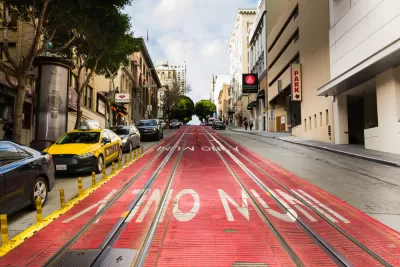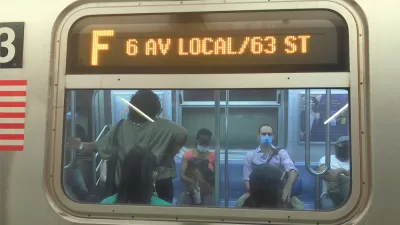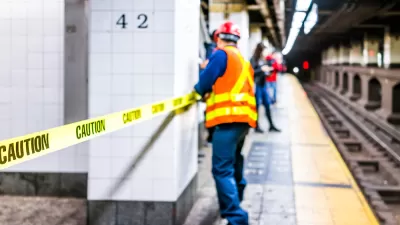California has traditionally granted environmental exemptions to large projects like football stadiums, a practice criticized by environmentalists and urbanists alike. SB 288 would change that, with exemptions for sustainable transportation projects.

"Transportation projects focused on public transit, bikes and pedestrians — but not cars — would get fast-tracked for construction under a bill Sen. Scott Wiener, D-San Francisco," reports Carolyn Said.
State Senator Wiener's goals for the legislation are to stimulate the economy by prioritizing sustainable transportation.
Senate Bill 288, named the Sustainable Transportation COVID-19 Recovery Act, would exempt transportation projects deemed sustainable from challenges under the California Environmental Quality Act (CEQA), explains Said. "Projects must pass certain criteria to win the bill’s CEQA exemptions. They must be located on public rights of way in areas that are already urbanized. If they are large, they must be part of a regional transportation plan."
One kind of private project would also gain the benefits the law would confer on public transit and alternative transportation projects: publicly accessible electric-vehicle charging stations.
Said mentions specific, ongoing projects that would stand to benefit if the legislation is approved.
FULL STORY: Proposed California law would fast-track environmentally sustainable transit

Planetizen Federal Action Tracker
A weekly monitor of how Trump’s orders and actions are impacting planners and planning in America.

Maui's Vacation Rental Debate Turns Ugly
Verbal attacks, misinformation campaigns and fistfights plague a high-stakes debate to convert thousands of vacation rentals into long-term housing.

Restaurant Patios Were a Pandemic Win — Why Were They so Hard to Keep?
Social distancing requirements and changes in travel patterns prompted cities to pilot new uses for street and sidewalk space. Then it got complicated.

In California Battle of Housing vs. Environment, Housing Just Won
A new state law significantly limits the power of CEQA, an environmental review law that served as a powerful tool for blocking new development.

Boulder Eliminates Parking Minimums Citywide
Officials estimate the cost of building a single underground parking space at up to $100,000.

Orange County, Florida Adopts Largest US “Sprawl Repair” Code
The ‘Orange Code’ seeks to rectify decades of sprawl-inducing, car-oriented development.
Urban Design for Planners 1: Software Tools
This six-course series explores essential urban design concepts using open source software and equips planners with the tools they need to participate fully in the urban design process.
Planning for Universal Design
Learn the tools for implementing Universal Design in planning regulations.
Heyer Gruel & Associates PA
JM Goldson LLC
Custer County Colorado
City of Camden Redevelopment Agency
City of Astoria
Transportation Research & Education Center (TREC) at Portland State University
Jefferson Parish Government
Camden Redevelopment Agency
City of Claremont





























